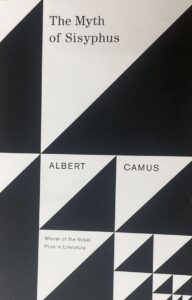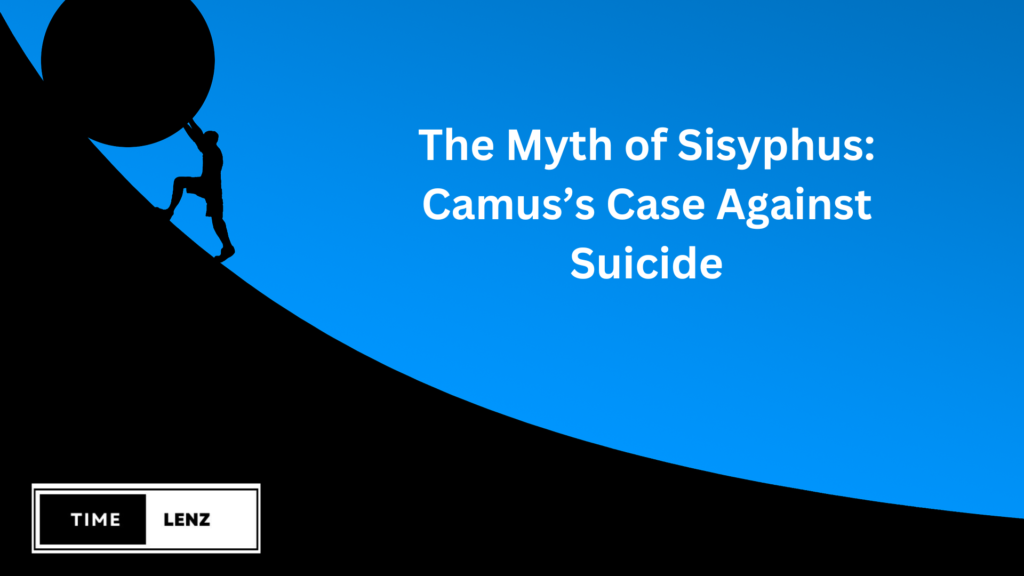The Myth of Sisyphus is an extended essay by Albert Camus that discusses the human condition and existence. However, Camus is not an existential writer, and his philosophy needs to emphasise more reasoning and meaning.
According to Camus, the universe is meaningless, and human beings try to find meaning and give a reason for their existence.
But since there is no ultimate reason for the universe, people fall into the idea of the absurd. Camus was not an atheist but didn’t believe in God. For him, our existence has no meaning, and the absurdity of life knows that life has no purpose but still does what we are supposed to do.

Lastly, if there is no meaning to life, then the best choice for an individual is to commit suicide. However, Camus opposed the idea of suicide, even though he was ascribed to the notion that life has no purpose or ultimate goal. In, Myths of Sisyphus, Camus tries to answer the biggest question of human life’s existence; Why not kill yourself?
Beyond Meaning: Thriving in the Absurd
There is no purpose in life, and all human beings exist on the planet without any motive, aim or goal. This is the idea behind the absurdity of life, our existence without any reason whatsoever.
Over the years, billions came and went into the abyss of the universe without any purpose. And even though people seek all kinds of meaning in their lives, they are just the pigmentation of their realities and nothing else.
Every day we woke up, dress up, do our jobs, come home, rest and sleep, and the cycle continues. But a ‘Why’ comes up one day, and everything changes. Why are we here? What are we doing? Such questions are typical when you realise the absurdity of our lives.
The Comfort of Faith
Over thousands of years, people tackled the universe’s meaninglessness by using the idea of God. Furthermore, God is a vessel for our existential problems. God created the universe, and we are part of his plan, but what if there’s no God? Then absurdity comes up.
How can we thrive in a place of no meaning or faith? Camus believed that since there is no God, we must face life as it is.
Hope from Science and Enlightenment
Even science or enlightenment is meaningless. Improving your life does not give a reason for our existence. Moreover, the irrationality of rational behaviour does not justify our existence. So, no matter how hard we try, we can’t see the purpose of life.
And yes, some biological people will suggest that it’s the multiplication of species, but that is the act, not the reason for our existence.
Absurdism: Reality of Our Existence
Absurdism is not that life or the universe is absurd. It’s the human perspective of finding or giving reason to existence. So it’s our idea of seeing or perceiving life; since different views and philosophies exist, none is worthwhile.
Camus’s had no philosophy and was against people taking sides and defining truths. But, according to him, there is only one truth: death; everything else is just human consciousness and its creative power.
Irrationality of Universe
Univers is vast, empty, full of oversized objects and never-ending. No one knows anything about the universe. Furthermore, even scientists need to be more speechless about the universe.
No one can ever know the big questions about the universe, so we’re just left with our minds. Lastly, a higher purpose, paradise or even utopia, is just our way of escaping the harsh truths about life.
Human Yearning for Meaning
Even though there is no way to find meaning and purpose in the universe, the human brain still seeks the truth. Now what is truth? Such questions can wander your mind to places or ideas of a creator, god or a higher being.
Because god gives us the security of life after death or the purpose of the present, we fall into the trap of objectivity.
Meaninglessness of Perceiving Universe
The problem with perceiving meaning in the universe is filling a void incorrectly and inadequately. The truth is that there is no truth and no way to find one if it exists.
So, why bother with everything and end your life? Here Camus tries to justify life and the human yearning to live than die.
Plain Suicide v Philosophical Suicide
If there’s no purpose in life, then one should die. But Camuse finds this conclusion wrong because a person commits suicide. After all, he was trying to find meaning in life. Since there’s no meaning, seeking truth or purpose wastes time, and one should avoid it at all costs. Camus believes that plain suicide is ineffective in looking at things and falling for the trap of rationality.
However, to get free from everything, a person should commit philosophical suicide, which tries to give meaning to everything.
When the Why Arises, Face it?
So how to face something meaningless? Well, Albert Camus’s answer is to meet the situation. But, as there’s no higher purpose, today is all we have, so face it.
Do the things that you’re supposed to do without overthinking anything at all. That way, you’ll find a better place, free of worries.
How to Survive in the Absurd
Once you realise its presence, surviving the absurd is difficult, but Camus suggested some ways to cope with the situation.
They are revolting against existence, following their passion and being in the present, and one should know the situation to get beyond it without any mental warfare.
Revolt Against the very Nature of Existence.
Since there’s no meaning to existence, we should face it. An ideal way to do that is by living.
We live, we spend time, and then we die. So, why not do these things with fire and total capacity to get important gratification?
Be in the Present
Secondly, it is vital to be in the present, and it is the only best way to live. Moreover, the trap of time and routine can not penetrate the present to keep the worries at bay. Therefore, it is essential to stay in your lane and don’t overthink the things you are supposed to overthink.
Look for Thriving Passion
Following a passion gives you happiness because it is the only thing that will please the person. Also, following you is a selfish act without hidden motives for learning or earning; thus, follow your heart and enjoy what you like.

The Myth of Sisyphus: The Tale of Us
The Myth Sisyphus is an ancient myth where a person is tempted to push a rock to the mountain to drop it and start from the beginning.
Well, it’s the absurd hero, according to Camus, and that’s how er should act out in the world—knowing that we have to do the same things every day but enjoy them. And the only way it is possible is by accepting our fates and facing the situation.
Summary
The Myth of Sisyphus is an essay by Albert Camus that discusses the human condition and existence but opposes the idea of suicide. It argues that our existence has no purpose and that we must face life as it is, with no hope from science or enlightenment. Camus argued that there is only one truth: death and that the human yearning for meaning in the universe is futile.
He argued that seeking truth or purpose wastes time and should be avoided. Albert Camus suggests that to get free from everything; one should commit philosophical suicide, revolt against existence, be in the present, and follow their passion. The myth of Sisyphus suggests that we should accept our fates and face the situation.


😍😍😍
Pingback: The Philosophical Brilliance Of The True Detective Season 1